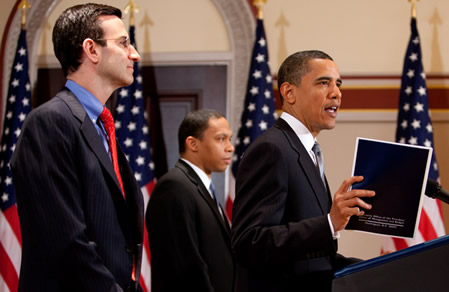Obama's Nuclear Agenda: the Budget and Beyond
February 1, 2010
Featured Image
We are happy to serve you a daily summary of the day's top nuclear policy stories each morning, with excerpts from the stories in bullet form.
Stories we're following today:
Debate heats up on Obama's nuclear agenda - Laura Rozen in Politico [link]
- As Vice President Joseph Biden took to the Wall Street Journal oped page [Friday] to argue for Obama's nuclear vision, security experts and non-proliferation advocates seized the moment to try to advance Obama's ambitious non-proliferation goals in the face of recent political setbacks.
- "The Obama administration's plan to increase long-term funding for the nuclear stockpile management program underscores the fact that the United States can continue maintain a reliable arsenal without resuming nuclear testing or building newly-designed nuclear warheads," Daryl Kimball, executive director of the Arms Control Association and Director of the Project for the Comprehensive Test Ban Treaty, writes.
- "I really think what the president said the goal was -- total disarmament, should become the operational plan: not a distant vision, but a real thing," Barry Blechman, co-founder of the Stimson Center, said.
- Obama will have allies from across the political spectrum if he goes for the big enchilada in his nuclear non-proliferation goals, including a bunch of former Cold Warriors now advocating the global nuclear zero goal.
President Obama's Fiscal Year 2011 Budget - The White House [link]
- The Budget provides $2.7 billion, an increase of $550 million over the 2010 appropriation, to prevent the proliferation of nuclear weapons. This increase supports the strategy to move toward a world without nuclear weapons.
- This investment fully funds efforts to: secure nuclear material; develop technology to detect and deter nuclear testing and smuggling; and support international nonproliferation treaties, regulatory controls, and safeguards.
- The 2011 Budget funds $8.1 billion to improve the nuclear stockpile’s safety, security, and effectiveness with more extensive life extension programs, upgrades to the infrastructure supporting the life extension programs, and new initiatives in naval reactors work.
US Speeding Up Missile Defenses in Persian Gulf - New York Times [link]
- The Obama administration is accelerating the deployment of new defenses against possible Iranian missile attacks in the Persian Gulf, placing special ships off the Iranian coast and antimissile systems in at least four Arab countries, according to administration and military officials.
- The deployments come at a critical turning point in President Obama’s dealings with Iran. After months of unsuccessful diplomatic outreach, the administration is trying to win broad international consensus for sanctions against the Iranian Revolutionary Guards Corps, which Western nations say control a covert nuclear arms program.
- The news that the United States is deploying antimissile defenses — including a rare public discussion of them by Gen. David H. Petraeus — appears to be part of a coordinated administration strategy to increase pressure on Iran.
- “Our first goal is to deter the Iranians,” said one senior administration official. “A second is to reassure the Arab states, so they don’t feel they have to go nuclear themselves. But there is certainly an element of calming the Israelis as well.”
Proposal would eliminate funding for Yucca Mountain - Las Vegas Review-Journal [link]
- President Barack Obama will propose eliminating funding for the Yucca Mountain Project in a new budget he will submit to Congress today, said Nevada lawmakers who were notified over the weekend.
- Also, White House officials said they will take steps "in the near future" to withdraw a pending license application to build the long-planned nuclear waste repository, which could be a decisive move in ending the government's 23-year focus on developing the Nevada site for radioactive waste storage and disposal.
- "President Obama is keeping his word to Nevada, and I thank him for working with me as we try to find a safer solution for dealing with the nation's nuclear waste," Sen. Harry Reid, D-Nev., said in a statement.
- "This budget is a bulldozer that will help Nevada flatten Yucca Mountain into a permanent pile of rubble," said Rep. Shelley Berkley, D-Nev.
Docu Paints Convincing Nuclear Doomsday Scenario - Hollywood Reporter (via Reuters) [link]
- A doomsday doc suggesting that climate change and eco-degradation aren't going to matter much if we blow up the planet first, "Countdown to Zero" reminds viewers of old fears most people have put on a back burner. Convincingly argued and extremely polished, the Sundance festival selection has theatrical potential for audiences whose reservoir of worry about humanity's future hasn't already run dry.
- Taking cues from a famous JFK speech, the documentary studies three ways -- accident, miscalculation, and madness -- in which nuclear weapons might be detonated. Director Lucy Walker (also bringing the lighter-hearted "Waste Land" to Sundance this year) makes the odds look pretty bad on all three fronts, especially when a scientist points out that, even in terms of unlikely scenarios, "low-probability events happen all the time."
A View from the Dark Side
Senate Should Uphold Reagan's Vision on Arms Control - The Heritage Foundation [link]
- Amidst a constant barrage of Russian demands, the Obama Administration canceled the Bush-era European missile defense and has sought to reduce total missile defense funding.
- The Obama Administration’s haste to “get to zero” has clearly emboldened Moscow in the negotiations over the successor treaty to the 1991 Strategic Arms Reduction Treaty (START). According to the Russian press, Kremlin sources are saying that Moscow feels it has the upper hand in the negotiations because the follow-on treaty is perceived as more important to the U.S. than Russia.
- Ronald Reagan’s vision compelled him to walk away from the talks at Reykjavik on the grounds that Moscow’s proposals would make the U.S. more vulnerable. Likewise, the U.S. Senate must ensure that the new treaty is also consistent with Reagan’s principles or refuse to ratify it.



